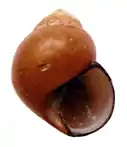| Bithynia funiculata | |
|---|---|
 | |
| Apertural view of the shell of Bithynia funiculata | |
| Scientific classification | |
| Domain: | Eukaryota |
| Kingdom: | Animalia |
| Phylum: | Mollusca |
| Class: | Gastropoda |
| Subclass: | Caenogastropoda |
| Order: | Littorinimorpha |
| Superfamily: | Rissooidea |
| Family: | Bithyniidae |
| Genus: | Bithynia |
| Species: | B. funiculata |
| Binomial name | |
| Bithynia funiculata Walker, 1927 | |
| Synonyms[1] | |
| |
Bithynia funiculata is a species of freshwater snail with a gill and an operculum, an aquatic gastropod mollusk in the family Bithyniidae.
Taxonomy
Previously (for example WHO 1995)[2] considered this taxon to be a subspecies of Bithynia siamensis, however, Bithynia funiculata is treated as a separate species in the 2012 IUCN Red List.[1]
Distribution
Distribution of this species includes:
Ecology
Bithynia funiculata is an intermediate host for:
- The cat liver fluke Opisthorchis tenuicollis[1]
- This species transfers echinostomiasis.[1]
- Some references also mention also the trematode Opisthorchis viverrini as a first intermediate host.[2]
References
- 1 2 3 4 5 6 Richter, K.; Simonis, J. (2012). "Bithynia funiculata". IUCN Red List of Threatened Species. 2012: e.T184937A1767230. doi:10.2305/IUCN.UK.2012-1.RLTS.T184937A1767230.en. Retrieved 18 November 2021.
- 1 2 World Health Organization (1995). Control of Foodborne Trematode Infection. WHO Technical Report Series. 849. PDF part 1, PDF part 2. page 125.
This article is issued from Wikipedia. The text is licensed under Creative Commons - Attribution - Sharealike. Additional terms may apply for the media files.
